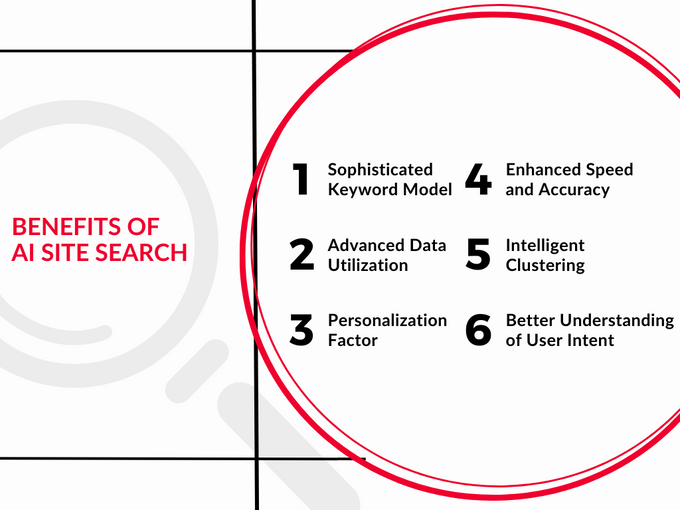The Power of AI in eCommerce Site Search
AI can power up your internal site searches, ensuring customers find what they're looking for every time.
Updated November 19, 2024.

AI can do a lot for your eCommerce site. Sure, AI-based personalization often steals the show, but AI-driven search functionality is equally important. Think of site search as a service for your customers and a diagnostic tool for you. With AI, you get better product suggestions and smarter data analysis.
But AI isn’t perfect. So, where’s the sweet spot for using AI in eCommerce site search engines? Let’s chat about the pros and cons of AI, and figure out how to get the most out of it.
» Seeking out ChatGPT alternatives? Be on the lookout for these emerging AI technologies.
Meet the Expert
Jameela Ghann is a seasoned online store owner with over a decade of eCommerce experience. Apart from running Alora Boutique, she's also the marketing manager for Fera Product Reviews.
How AI Has Impacted eCommerce
AI is changing eCommerce for all shops, big and small. Here's how:
- Process Efficiency: AI can make eCommerce stores more efficient. For example, small businesses use AI on platforms like Shopify to automatically create product descriptions.
- Personalized Interactions: Big companies use AI and large data sets to better understand what their customers want. This includes using chatbots and making it easier for customers to find products they’re interested in.
- Automation for Small Businesses: AI can automate tasks for small businesses. Tools like ManyChat on Facebook help these businesses interact with customers, guide them through the buying process, and increase sales.
- Customer Expectations: Customers are now expecting to see AI and automated features when they shop online. They’re not just looking for personalized product recommendations, but also things like automatic coupon codes.
» Complement AI tools with best practices for eCommerce site search.
Benefits of AI Site Search in eCommerce
There are many benefits of AI in eCommerce, and lots of them converge in AI site search. Let's look at the specific benefits of AI tools to your website search.
1. Sophisticated Keyword Model
In the past, site search was similar to the keyword-focused model used by search engines like Google. Users had to input keywords and hope to find a match on the website. This often led to practices like keyword stuffing.
AI site search takes a more advanced approach:
It uses natural language processing and semantic search. This allows AI to understand long-tail queries like ‘console table’ or ‘coffee table’ without needing to stuff keywords.
This change gets rid of the old practice of tweaking pages for search engine crawlers.
The benefits of this model include:
- Easier and more versatile search functionality
- Smarter content creation
- Efficient keyword research
- More accurate search results
2. Advanced Data Utilization
AI site search goes beyond traditional methods by using advanced data techniques like vector search and hash search.
Instead of relying on structured data and set rules like traditional engines, AI looks at the relationship and sentiment between keywords. This gives a more detailed understanding.
Since AI relies on semantics, text recognition, and sentiment analysis, it can gather data from more sources:
- Search queries
- Social media posts
- Phone calls
- Messages
These sources are invaluable for gathering customer feedback, improving customer experience and, ultimately, optimizing for KPIs.
3. Personalization Factor
One of the key benefits of AI site search is personalization. Modern tools are far more effective at processing large datasets to enhance user experiences.
Personalized digital marketing and site search begin with individual accounts and extend to collective data insights:
- Individual: Personalization starts when users create accounts on a site. The algorithm uses account activity to make personalized recommendations for the user.
- Similar Group and Collective Data: AI algorithms can analyze search patterns of users with similar interests or demographics. This allows them to predict and present results relevant to the group.
- Regional and National: For example, if a large e-commerce store serves a specific country with a significant user base, AI can personalize for large groups. It can understand regional preferences and tailor search results accordingly.
Example
Platforms like Amazon leverage extensive user data, including search history and buying preferences. This wealth of information empowers AI to analyze trends and showcase search results aligned with a user's demographic or preferences.
» What should be tailored to your customers? Find out where to personalize your eCommerce store.
4. Enhanced Speed and Accuracy
AI site search outpaces traditional methods in terms of speed and accuracy.
The advanced algorithms process queries swiftly, delivering precise results to users in a fraction of the time.
Optimized internal search metrics increase:
- Overall customer satisfaction
- Relevance and performance of search results
- Conversion rates
- Customer retention
5. Intelligent Clustering
Unlike traditional search, AI site search uses intelligent clustering.
Beyond just showcasing products, AI tools can present blog posts and tutorials that align with user intent.
This feature ensures that users find relevant information, whether they're seeking products or educational content.
For SMBs, this can be a valuable tool to introduce assets and further nudge the customers in the marketing funnel.
6. Better Understanding of User Intent
All the other benefits would not mean much if AI didn't excel in understanding user intent.
It goes beyond merely displaying products and recognizes when users might be searching for tutorials or informative content.
This nuanced understanding enhances the overall search experience for users. It also helps eCommerce stores:
- Optimize pricing strategies
- Create better marketing campaigns
- Boost customer satisfaction
- Increase overall store performance
Example
CURATEUR uses autocomplete function to direct customer at the very beginning of their search query. This triggers the store's own assortment of products, leading to link relevance and the fact that the shopper will see the products at the very start of their journey.
» Discover the best searchandising strategies to grow your business.
Limitations of AI in Site Search
While AI can greatly enhance merchandising and site search, it’s important to consider its limitations before making a decision for your business.
Two key things to consider when it comes to AI are:
- Cost: Using advanced features and interfaces can be expensive. Even if you have the skills to use AI tools, they require a significant time investment.
- Privacy: Data mining from customer interactions can raise privacy issues. Businesses need to be transparent and ethical in their AI data privacy practices and ensure they have privacy safeguards in place.
Despite these considerations, there are many affordable solutions available.
By implementing proper safeguards, businesses can balance the benefits of AI in site search with privacy concerns.
Before deciding, consider the cost and privacy implications alongside the benefits of AI. Then, determine if AI site search tools align with your business strategy.
AI Done Right: New and Improved eCommerce Site Search
AI tools can enhance your eCommerce site’s search more easily than before. But remember, costs and data privacy risks are involved. Staying updated with trends like voice search and visual search, and learning from others, can shape your AI strategy.
Start by understanding your competitors’ strategies. Platforms like Fera offer app detectors for Shopify Search. You can use these to see what plugins your competitors are using. This can lead to a smarter and more effective use of AI in site search.








